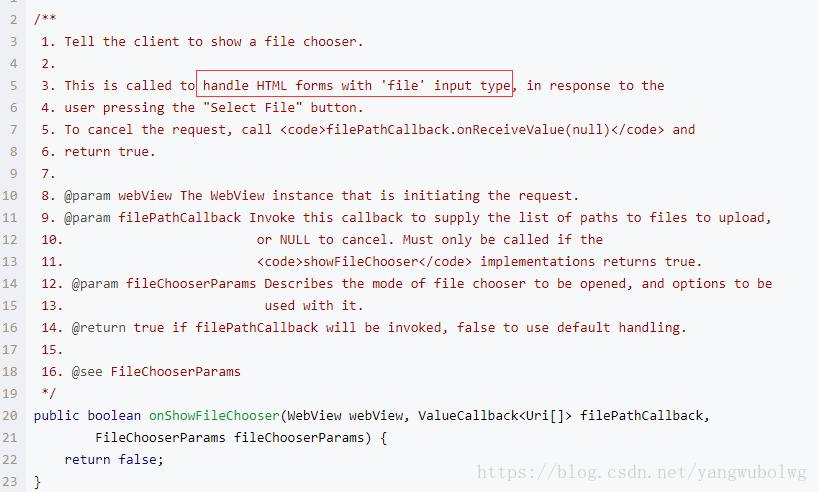这篇文章主要介绍了如何使用webview适配H5上传照片或者视频文件,具有一定借鉴价值,感兴趣的朋友可以参考下,希望大家阅读完这篇文章之后大有收获,下面让小编带着大家一起了解一下。
一、需要实现的功能:
用H5实现的App中需要在H5获取手机中的照片或者视频文件上传到服务器。

二、分析实现方法:
由于不懂前端开发,不知道H5中有 input file之类的标签控件,可以用来选择文件,刚开始的思路还是想着native 端是否要通过提供inputstream流方式,将文件内容传递给JS。后来和前端沟通之后,H5在电脑端都是用input 设置type为 file 来实现文件选择功能,于是才开始搜索资料,发现时需要在webview中设置 setWebChromeClient ,其中有对input 的响应回调:
三、具体实现:
前端代码
<input type="file" accept="*/*" name="choose file">
<input type="file" accept="image/*" name="choose image">
<input type="file" accept="video/*" name="choose video">
<input type="file" accept="image/example" name="take photo and upload image">
<input type="file" accept="video/example" name="take video and upload video">native端代码:
@RequiresApi(api = Build.VERSION_CODES.LOLLIPOP)
@Override
public boolean onShowFileChooser(WebView webView,
ValueCallback<Uri[]> filePathCallback,
WebChromeClient.FileChooserParams fileChooserParams) {
mFilePathCallbacks = filePathCallback;
// TODO: 根据标签中得接收类型,启动对应的文件类型选择器
String[] acceptTypes = fileChooserParams.getAcceptTypes();
for (String type : acceptTypes) {
Log.d(TAG, "acceptTypes=" + type);
}
// 针对拍照后马上进入上传状态处理
if ((acceptTypes.length > 0) && acceptTypes[0].equals("image/example")) {
Log.d(TAG, "onShowFileChooser takePhoto");
Intent it = CameraFunction.takePhoto(mContext);
startActivityForResult(it, TAKE_PHOTO_AND_UPLOAD_REQUEST);
return true;
}
// 针对录像后马上进入上传状态处理
if ((acceptTypes.length > 0) && acceptTypes[0].equals("video/example")) {
Log.d(TAG, "onShowFileChooser record video");
Intent it = CameraFunction.recordVideo(mContext);
startActivityForResult(it, RECORD_VIDEO_AND_UPLOAD_REQUEST);
return true;
}
Intent intent = new Intent(Intent.ACTION_GET_CONTENT);
intent.addCategory(Intent.CATEGORY_OPENABLE);
if (acceptTypes.length > 0) {
if (acceptTypes[0].contains("image")) {
intent.setType("image/*");
} else if (acceptTypes[0].contains("video")) {
intent.setType("video/*");
} else {
intent.setType("*/*");
}
} else {
intent.setType("*/*");
}
WebViewActivity.this.startActivityForResult(Intent.createChooser(intent, "File Chooser"),
REQUEST_FILE_PICKER);
return true;
}回调设置uri
/**
* 设置input 标签出发的回调选择文件路径,优先使用path参数,
* 其次使用uri参数
* @param uriParam
* @param pathParam
*/
private void setFilePathCallback(Uri uriParam, String pathParam) {
//都为空,则设置null
if (uriParam == null && pathParam == null) {
if (mFilePathCallback != null) {
mFilePathCallback.onReceiveValue(null);
}
if (mFilePathCallbacks != null) {
mFilePathCallbacks.onReceiveValue(null);
}
} else if (null != pathParam) { // 优先使用path
if (mFilePathCallback != null) {
Uri uri = Uri.fromFile(new File(pathParam));
mFilePathCallback.onReceiveValue(uri);
}
if (mFilePathCallbacks != null) {
Uri uri = Uri.fromFile(new File(pathParam));
mFilePathCallbacks.onReceiveValue(new Uri[] { uri });
}
} else if (null != uriParam) { //其次使用uri
if (mFilePathCallback != null) {
String path = UriUtils.getPath(getApplicationContext(), uriParam);
Uri uri = Uri.fromFile(new File(path));
mFilePathCallback.onReceiveValue(uri);
}
if (mFilePathCallbacks != null) {
String path = UriUtils.getPath(getApplicationContext(), uriParam);
Uri uri = Uri.fromFile(new File(path));
mFilePathCallbacks.onReceiveValue(new Uri[] { uri });
}
}
mFilePathCallback = null;
mFilePathCallbacks = null;
}针对各个请求场景进行处理:
public void onActivityResult(int requestCode, int resultCode, Intent intent) {感谢你能够认真阅读完这篇文章,希望小编分享的“如何使用webview适配H5上传照片或者视频文件”这篇文章对大家有帮助,同时也希望大家多多支持亿速云,关注亿速云行业资讯频道,更多相关知识等着你来学习!
亿速云「云服务器」,即开即用、新一代英特尔至强铂金CPU、三副本存储NVMe SSD云盘,价格低至29元/月。点击查看>>
免责声明:本站发布的内容(图片、视频和文字)以原创、转载和分享为主,文章观点不代表本网站立场,如果涉及侵权请联系站长邮箱:is@yisu.com进行举报,并提供相关证据,一经查实,将立刻删除涉嫌侵权内容。
原文链接:https://www.jb51.net/html5/750825.html